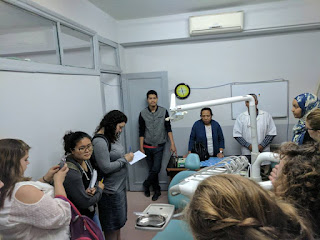Hi everyone. I go study abroad at Madagascar for 6 weeks. It is adventure and amazing time of my life. Our academic director is Dr. Nat. He calls him as Dadabe (grandpa in Malagasy). Here is my 6 weeks journals.
Week 1: The program schedule for the first
week is much better than what I expected.
The resort where we stay is very peaceful.
It gives us such a warm welcoming feeling,
the same as we feel from Dr. Nate and the SIT team. I like that the program gives us time to
slowly adjust to the Madagascar time zone, weather, and new lifestyle. The surprising part of the first week is how
quickly students in the program become friends.
I think it is because we shared the same situation about being bound
together in a new place. The materials
of the program are well structured to introduce us to the program. We had an introduction to the traditional
medicine and health care systems in our Madagascar lecture. We also started our Malagasy language
class. I feel we learned so much already
in the first week.
Dr. Nat also took us
to visit and interview traditional healers.
Although I like to be busy, I like that Dr. Nat give us the day off on
Saturday. Some students took this chance
to visit the city. I preferred to have a
day off to take it easy and study. I was
worried about my English grammar.
However, Dr. Nat tells us “Being you, then you will be the best of
you. If you are trying to be as somebody
else, you always can be the second of them.” My English grammar may be not the best but I
will try to be the best I can be with my writing.
Week 2: We moved to stay with our host
family which turned out to be the most challenging thing for me. I thought I am very easy going and would not
have any problem with new people.
Surprisingly, I have a challenging time to adjust myself to my new
family for a while. However, the lovely
words of Dr. Nat as “Hakuna matata” – no worry, it is ok- keeps me positive even with all the
challenges. The class schedule is full
of new knowledge and interesting material.
In addition, we have outside activities that include visiting historical
sites and hospitals.
We have learned a
history of Madagascar and Traditional healers.
There are many types of healers, not just for medicine. We also have a fantastic opportunity to
conduct interviews about the traditional medicine and health care system in
Madagascar with the director of the public hospital and another physician.
The surprising part of visiting the public hospital is that
the hospital could not give the medicine to a patient until they have agreement
of payment. If patients do not have
money to pay, they get sent to another hospital or home. This is so sad for me. We also visit the private clinic that is
founded by the church. It makes me
realize how important this service is to the healthcare for poor people. This private clinic offers a service with a
low cost because the clinic is founded by the church.
The program provides us transport from our houses to school,
a tasty tea break, and delicious lunch.
While I enjoy learning such wonderful material, all students seem to
enjoy visiting La City with free Wi-Fi too. On Saturday, we have a family
picnic at the park. It becomes such a
fun day for me and everyone. I feel very
happy and relaxed from all the challenges that I have – the difficulty of my
English ability and adjusting to homestay.
I have a chance to interact with Malagasy students who join the picnic
with us as well. We have lunch, play
games, and dance together. It is one of
my favorite times of the trip.






No comments:
Post a Comment